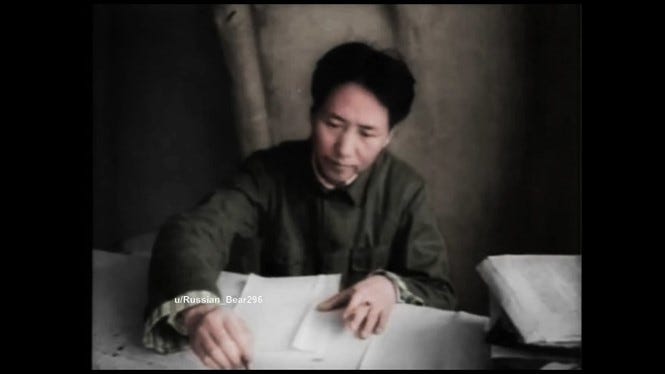From Tingchow to Changsha [July 1930]
[a tsu, to the melody Butterfly Courts Flower, Tieh Lien Hua]
[translated by Nancy Lin]
We are the hosts of June’s fire
Out to scorch the sinful and corrupt.
The Magic Cord of myriad yards in our hands,
The rocs and whales we’ll surely truss.
Hail the battalions of Huang Kung-lueh:
That whole tract by the River Kan flames red!
A million workers and peasants
Combat-fit and eager to man,
We sweep through Kiangsi,
We storm toward Hunan and Hupei.
We launch the stirring Internationale
As the whirlwinds join us from on high.
Notes [by Nancy Lin]:
The Magic Cord is derived from the remark of a Han dynasty scholar Chung Chun, who proposed to the Emperor of Han that he truss the King of Southern Yueh with his ‘long cord’ on his volunteer mission there, and deliver the King to the imperial court – the term having been used since to mean an invincible weapon.
Huang Kung-lueh, a co-provincial of Mao’s and a valiant commander in various revolutionary campaigns. He faithfully adhered to the rural-oriented policy of Mao’s until he fell in action near Chi-an in October 1931.
The adventurist line of Li Li-san calling for a general offensive against urban centers resulted in reverses under the walls of Changsha and other cities in summer 1930. Mao was then busy consolidating rural bases back in Fukien when he was obliged to march to Changsha’s rescue from Tingchow, west Fukien. He succeeded, however, in dissuading the Party from pursuing the mistaken strategy and directed his forces actually to extending further the rural zones in west Kiangsi and east Hunan.
In extolling the deed of Huang Kung-lueh and the spread of Red power, the poem has primarily these rural successes in view, achieved as they were in spite of the losses elsewhere under Li Li-san’s leftist opportunism.



